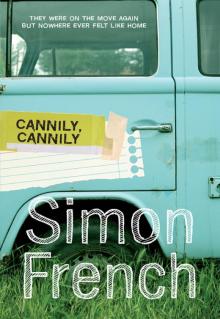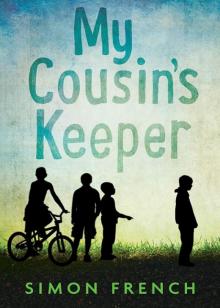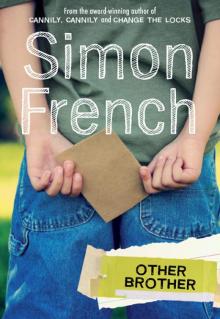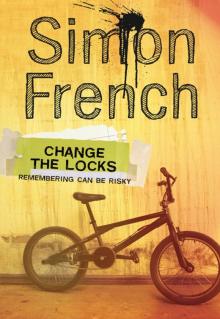- Home
- Simon French
Change the Locks Page 6
Change the Locks Read online
Page 6
“Nice one, Patrick …”
“It’s you,” he said in an urgent whisper.
“What’s me? You wrecked my game. What’re you talking about?”
“Here in the paper. You and your mum. It is. Look!”
The thick black headline read “Squatters, unseated”, and underneath was all that Patrick had read.
“In the picture,” he said again. “Look.”
So I did. At the faces of policemen and women, at the man with a television camera on one shoulder. At the policewoman who had a teenage girl in an arm lock and the policeman who carried a small dark-haired boy. Everybody in the picture was looking backwards and sideways, except for the girl and the little boy who had stared straight at the person taking the photo.
“See?” Patrick said in a whisper.
It was the girl and the little boy I stared at the longest, because the girl was my mum. And the little boy, wide-eyed and terrified, was me.
CHAPTER 8
In the place I had come from, there was a bare white room with mattress beds scattered across the floor, bags that spilled clothing and a little gas stove that I was always warned away from. I could see my feet in little sneakers, running across the floorboards. The air, it smelled of traffic.
There were lots of people’s faces and lots of arms to hold me.
Take him, will you? My mum’s voice. But my hands were always stretched out to her.
Take that child. A man’s voice and a shoulder of blue woollen uniform.
I gazed at the newspaper page for a long time.
“Let’s go and show Mum and Dad,” Patrick said, excited and disbelieving.
But I grabbed his arm whispering back, “No, don’t.”
“How come? It’s incredible.”
“I just don’t want you to.”
“But it’s amazing. Like something in a book. Or a movie, or … are you crying?”
“No!” I answered fiercely and scrubbed at my face with one hand.
Patrick quietened down then and settled beside me. We re-read every word in the newspaper story.
“What’s ‘protective care’ mean?” Patrick asked. “Is it like hospital?”
“Don’t know,” I said quietly.
“And did your mum have to go to jail? It doesn’t say.”
“I don’t know. She’s never told me anything about this.”
“It’s the mystery, then, isn’t it? But you’ll have to show your mum …”
“She’ll spin out.”
“… and ask her.”
“What’s a squatter?” I asked.
Patrick thought a moment. “When you’re living somewhere you’re not supposed to be. Like that old building in town near Mum and Dad’s shop. There are people living in there. The police keep booting them out.”
I stared at my pre-school reflection. After a while, Patrick said softly, “In the picture, Steven, you look really frightened.”
I nodded, slowly.
“Maybe that’s why she won’t talk about it. You know, because it was really scary.”
“Maybe for her, too,” I added.
“What about when you were in the car? Like you said yesterday? And you were lost?”
“I can’t remember.” I sighed after saying that, and my breath was shaky. I pulled the page from the remainder of the newspaper. “Can I take this home?”
“Yeah, sure.”
“And don’t tell your parents. Or anyone.”
At home, I hid the newspaper page at the bottom of my wardrobe. For the first few days I wanted to forget it was there at all, but quietly and as often as possible, I got it out to read over and over. I read it until I had it memorised.
“What happened to us?” I asked my reflection in the photo, and it stared back, wide-eyed and wordless.
I tried to make myself show the page to Mum, but couldn’t. She was bothered enough as it was. I knew, because I lay awake the nights that Katrina brought us dinner and then stayed late talking. I had eavesdropped for as long as I could stay awake, and their voices drifted up the hallway to my room, along with the murmur of music and the clinking of glasses or coffee mugs.
It was my mum’s voice I especially listened to. About the house.
“I don’t know how much longer I can manage this. Everything you’re doing is terrific, but I need that car back. Except I doubt it’ll ever turn up now.”
About Darryl.
“He won’t be back. He used this place to stash his bike rubbish and put his feet up. He used us.” A pause. “I can’t believe I trusted him for so long. Thought he was wonderful, good for Steven and all. And he runs off with someone else. I can’t let it happen again.”
And me.
“Steven? I dunno what’s up with him. Probably the same things that are up with me. Yeah, he puts it on for you, but he can be a pain, sometimes.”
Katrina’s voice, then. “Steven? C’mon, Lisa, you’re lucky to have him. Lucky to have them both. They’re great kids.”
“No,” Mum continued, “since Darryl went … Steven’s started coming at me with all these questions.”
“About?”
“About … before. Everything that happened in the city. And afterwards.”
“So he remembers?”
“He can’t, he was too young. But …”
“He’s old enough to understand, Lisa.”
“Why? It’s the past. It’s done with.”
“D’you think he’ll hate you? Is that it?”
“Whose side are you on?”
“I’m on your side. And Steven’s and even Dylan’s. If Steven asks you something … about his life … why don’t you tell him? Give him a break. Give yourself a break.”
And later, there was the sound of Katrina’s car starting up and leaving, Mum clicking off lights and walking into her room.
But I was awake in a room somewhere else.
There was a rush of voices and shouts. A door crashed open and footsteps thundered in the hallway. More shouting, a scream. Police, police everywhere.
Even though I could hear Mum’s voice nearby, it wasn’t her hands that reached down to pick me up.
Mum.
And the lights came on in a glare that hurt my eyes.
“What’s wrong, Steven? Ssh, you’ll wake Dylan. What is it?” Mum’s face was close to mine and we weren’t in that other place, but here … my own bedroom.
Dylan whimpered in his cot.
“Someone,” I managed, untying knots in my head, “someone’s trying to get in.”
“Here?”
“No, there. Police. Someone. They were outside.” I was sitting up in bed now. Mum wrenched the blankets and sheet free of my legs and feet, clutched me by one shoulder and steered me out of bed and into the hallway.
“What are you talking about?” she asked, leaning over so that our eyes were level. “There’s no one else here, just us. Got it? You were dreaming.”
“No, they were trying to get in.”
For a moment, there was silence. “Why are you doing this?” she said then.
The last bit of sleep left my head. I rubbed my eyes, properly awake.
“Has Darryl still got our door key?” I asked.
Mum closed her eyes in exasperation. “No, he hasn’t. And I don’t think he’s the slightest bit interested in having one. Now go back to bed and sleep.”
And on the floor next to my bed was the newspaper page. After looking at it earlier, I’d forgotten to hide it away again. It would have been so easy to have reached out and handed it to my mum.
There. That’s us, isn’t it?
Coward, I told myself over and over.
“Coward!” Katrina told Mum, and laughed. “We’re only inviting the guy out for a quiet evening in town.”
Mum groaned.
“So, what’s he like?” Katrina asked. She had found out about Neal at the old school.
“How should I know?” Mum replied. “Ask Steven. I’ve never spoken to the g
uy.”
“I dunno,” I said, but then told them a few details. I wasn’t in a talkative mood.
“There you go,” Katrina said, patting Mum on the back.
Mum didn’t look impressed.
“Look,” Katrina protested, “how long is it since you’ve left this house for an evening out?”
“Not long enough,” Mum replied.
“I have to get you out and about somehow, Lisa.”
“You weren’t planning on going to the Farmers Arms, were you?” Mum asked. “All Darryl’s old mates go there.”
“They’re all dags anyway …”
“Katrina …”
“Okay, okay. We’ll go to the Criterion, it’s more up-market.”
“And I’m bringing the kids …”
“I don’t want to go,” I said.
“And,” came Mum’s voice again, ignoring me, “don’t play matchmaker, right? I’m not having any of that.”
Katrina’s voice wasn’t so noisy this time. “Look, this Neal guy is divorced. He’s just moved house, he’s away from his kids, he doesn’t know anybody, maybe. We’re just being friendly. Okay?”
“Okay,” Mum agreed finally.
“I reckon,” Katrina added, “it’ll be good for all of us.”
“I don’t want to go,” I said again in a quieter voice, knowing already that I was stuck with an evening of sitting in a pub listening to adults talking.
By the time I was in Katrina’s car, crammed on the back seat with Dylan and Neal, I realised that something, this time, was different. Mum and Katrina weren’t in the usual jeans and T-shirts they wore to the pub, they were dressed up. I had to wind the window down a bit to try and escape the smell of perfume. And Neal, who had worn overalls the day he’d fixed my bike, was looking kind of dressed up as well.
“Didn’t realise it was going to be a family outing,” he said as Dylan clawed at his beard and the car began the climb out of the valley.
“Special occasion,” Katrina answered. “Not many single men around these parts. Are there, Lisa?”
Neal grinned to himself and I was sure I saw Mum elbow Katrina in the ribs.
The pub was a glare of light and colour. It made me nervous, and I found myself looking around for Darryl, his mates and even Redmond Hall. To one side of the Criterion’s entrance was the main bar, loud with music and laughter. Behind glass doors on the other side was a room with chairs and tables, an open fire, other people with their kids. We found a table near the fireplace and I slumped into a chair. I’d hardly spoken since we’d left home.
“Hey there,” Katrina said gently, “cheer up, Steven. This isn’t the Farmers Arms. You’re allowed to enjoy yourself.”
“Yeah,” I mumbled, and fixed my gaze on the front window and the view of the main street.
“You don’t really want to be here, do you?” asked Neal.
I looked up and saw Mum and Katrina over at the bar ordering drinks.
I shrugged. “Not really.”
“What was the Farmers’ Arms like?”
“We used to go there every Friday night with … Darryl. I hated that.”
“Who was Darryl?”
“He was Mum’s … a friend. I guess.” I looked over at Dylan, in his stroller. “He’s Dylan’s dad,” I added. It was hard to say that bit.
Neal looked embarrassed. “Sorry, I guess that’s personal.”
“It doesn’t really matter,” I said, and there was a sigh in my voice. “He’s gone now.”
Mum and Katrina were back then, clinking glasses onto the table, rustling a packet of crisps in my face and talking noisily about anything and everything. Their talk washed around me for a while, but then Dylan got bored and restless. So I took him for a walk outside, pushing the stroller along and back one length of the shopping centre. Young guys rumbled shiny cars steadily up and down the street, people were walking along the footpath and calling out, boyfriends hugged girlfriends, kids from school – dressed up and behaving themselves – stepped out of the Chinese restaurant with their parents.
Dylan drifted off to sleep and I drifted back to the hotel. Mum, Katrina and Neal were still talking, and there was a plate of hot food waiting for me. I settled down a little then. This place was different to the Farmers Arms – no Darryl and none of his noisy mates; the people in this room were quieter and even the jukebox was playing softly. A few kids from school were here with their parents, but not Redmond Hall. And no police.
That, suddenly, was the big difference. No cops striding through the doors here, asking, “Whose motorbikes are those on the footpath outside?” and “Whose children are these?”
No sooner had I thought that, than I saw them. They glanced through the pub windows as they walked by on the footpath outside, and their eyes seemed to stare straight at where we were sitting. They stopped for a moment.
I held my breath, as they stepped quietly into the room, as everyone around us stopped to look.
“Mum …” I nudged her shoulder.
She had been talking to Katrina and Neal, but stopped to murmur, “Here we go,” as the police walked straight towards us.
One of them was the young one who had come out to our house the day after the car had been stolen. The other one was a policewoman, and I was at least a bit pleased that it wasn’t Blyton this time. He would have said, Gidday there, young Steven, for the whole pub to hear.
“Ms Matovic?” Cartland asked.
It was weird hearing Mum called that. She looked up at him, not pleased, and said nothing.
For a second, he looked embarrassed. “We were passing by and I happened to see you here. We were going to call out your way tomorrow. It’s about your car …”
“What about it?” Mum asked.
Burnt out, stripped, dumped. I sank into my chair expecting to hear bad news. People around the room were still looking at us.
“Good news,” Cartland said, “it’s been found in one piece. Parked in a street down in the city.”
“The city?”
“It’s being held at one of the stations there. D’you want details?” He wrote down an address and phone number on a notepad page and handed it to her.
“How come my car’s at a police station?”
Cartland shrugged. “A crime they thought it was connected with. It’s been fingerprinted, but nothing came of it. It’s been there for a couple of days, so they want it collected as soon as possible. You’ll have to get yourself down there quick smart.”
“Know your way around the big city?” the policewoman asked.
And it was Mum who nodded, but me who answered, “We used to live there.”
CHAPTER 9
I had the car window down the tiniest bit, so that cold, freezing air stabbed at my forehead and slicked my hair hard against my head. Through the dust-streaked glass, there was a blur of roadside rocks and trees, the soft glow of early morning. Everything today had begun too early for me, and I leaned against the baby seat where Dylan was already sleeping. And I slept too.
Police.
You have five minutes to be off the premises.
Everyone out. Now!
Take that child.
A crowd of voices and a footpath, jagged with broken glass, busy with watching people. I was lifted into someone’s arms and saw Mum’s face, further and further away.
Mum.
Sometime later, she had come back, carried me quickly to the car. I’d sat in the front seat, never taking my eyes away from her. Asking, asking, Where are we going? Over and over.
Until she swung the car off the road in a windstorm of dust and flying stones.
And I woke.
My face was close to Dylan’s and he was still asleep. His chin had a flood of dribble that soaked into his fleecy top.
Now, the places outside the dust-streaked glass had traffic, houses, traffic and more houses, and it was the city we were close to. Neal had driven, had offered to as soon as Cartland had told us about our car. He wanted to vis
it his own children, but had also wanted to help us. Mum had said yes, ignoring my surprise, and Neal had arrived in the fog of early Saturday morning.
His car was almost a mirror image of ours. But the seats were blue instead of brown, there were no overflowing ashtrays or the smell of cigarettes and Katrina’s peppermints. No wind chimes hanging from the rear-view mirror. At my feet on the clean carpet was a pair of joggers that were not mine. My feet would have fitted them perfectly, but I knew whose son they really belonged to.
There was the baby seat next to me as well. “Used to be my little blokes who used it,” Neal had explained quietly. “I’m still unpacking and sorting stuff out and the seat was there amongst … everything else.”
I wondered how much Neal’s kids missed him.
I craned my head so that I could see between the front seats. Ten thirty-five on the dashboard clock; I’d been asleep almost three hours and my body was cramped and complaining.
Mum and Neal had been talking, but stopped when they heard me awake.
“With us again, tiger?” Neal asked, smiling into the rear-view mirror at me. “Hang in there. Another fifteen minutes and you can stretch your legs.”
Tiger. It was the sort of thing Mr Hetherington called Patrick. Tiger. Boyo. Mate. He called me that as well, sometimes. It made me feel as if I belonged there, almost a Hetherington instead of a Matovic.
“What’s your last name?” I asked Neal’s reflection in the mirror.
“Barradine,” he answered after a moment.
“You won’t find a parking space around here,” Mum said all of a sudden. “Turn right at the next set of lights.”
Neal looked surprised.
“I know this part of town,” Mum explained quickly. “We used to live near here. Turn left where that truck’s parked.” And she directed Neal away from skyscrapers and shadowed streets. We came to laneways and rows of old houses instead, and I wasn’t yawning and stretching any more; I was wide awake.
We used to live here. My school backpack was on the seat beside me. All the usual stuff had been emptied out to make way for Dylan’s nappies and bottles, but in the zip pocket at the front was the newspaper page I’d packed as well. Victoria Street. I looked for that road sign everywhere now, but couldn’t see it.

 Cannily, Cannily
Cannily, Cannily My Cousin's Keeper
My Cousin's Keeper Other Brother
Other Brother Change the Locks
Change the Locks